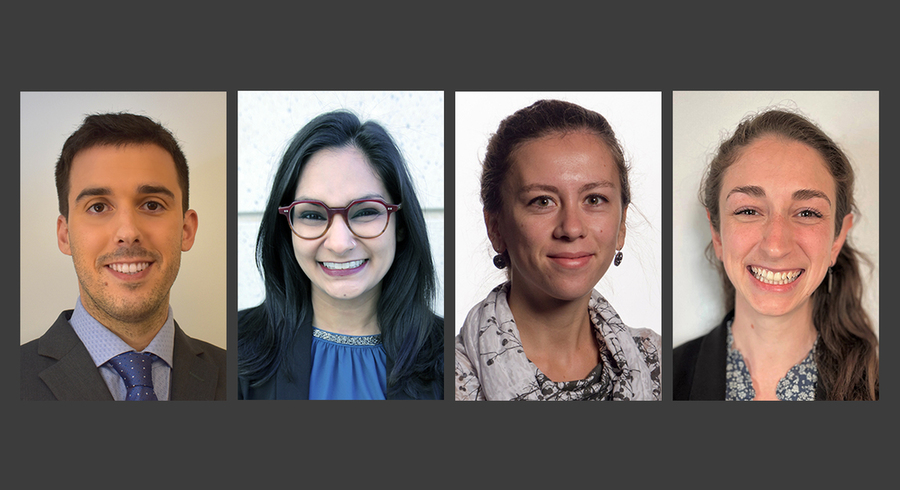Four researchers earn interdisciplinary Schmidt Science Fellowships

Left to right: Álvaro Fernández Galiana, Fatima Hussain, Sirma Orguc, and Rebecca Pinals have been named as Schmidt Science Fellows, an honor created in 2017 to encourage young researchers to pursue postdoctoral studies in a field different from their graduate work.
Four MIT-affiliated researchers are among 28 around the world to have been named to a competitive Schmidt Science Fellowship, an award created in 2017 to advance interdisciplinary studies among early-career researchers.
“An initiative of Schmidt Futures, delivered in partnership with the Rhodes Trust, the Schmidt Science Fellows program brings together the brightest minds who have completed a PhD in the natural sciences, mathematics, engineering, or computing, and places them in a postdoctoral fellowship in a field different from their existing expertise,” according to a recent announcement of the awards by benefactors Eric and Wendy Schmidt. “Fellows are supported for at least one and up to two years with a $100,000 per year stipend. The funding provides both training for the fellows and the research they undertake.”
Álvaro Fernández Galiana is a PhD candidate in mechanical engineering. As a member of MIT’s Laser Interferometer Gravitational-Wave Observatory (LIGO) Laboratory, he has focused on developing precision instrumentation to improve the sensitivity of interferometers used to detect gravitational waves. Earlier in his doctoral studies, he worked on the vibration isolation platform of the “squeezer instrument,” which reduces quantum noise. This breakthrough contributed to a 40 percent increase in the detection rate of the LIGO observatories. He has since been working on a compact version of this instrument with applications in metrology and quantum information experiments. As a Schmidt Fellow, he will shift gears to focus on solutions for population health monitoring. He plans to combine vibrational spectroscopy and machine learning to create a low-cost platform for multi-pathogen detection. This technology could be used for mass population screening and may improve health outcomes in resource-constrained environments and during future pandemics.
“I feel truly honored to become a member of the Schmidt Science Fellows program and join this vibrant scientific community,” says Fernández Galiana. “It is a unique and exciting opportunity to step outside my comfort zone and apply the knowledge and skills that I have gained at MIT at the interface of physics and engineering to a new discipline.”
In her doctoral work at MIT, Fatima Hussain PhD ’20 studied the impact of phages — viruses that infect bacteria — on the ecology and evolution of marine microbes, with Professor Martin Polz. As a Schmidt fellow, Hussain will be applying her expertise in marine microbiology and phage biology to the vaginal microbiome. Hussain plans to study how the immune system interacts with pathogens and healthy bacteria in the vaginal mucosa and aims to understand the impacts of these interactions on HIV risk. Ultimately, she hopes her work will lay the foundation for designing ecologically-informed and women-centric therapies to improve the health of women globally.
“The fellowship’s focus on interdisciplinary research is most appealing to me,” she says. “Having studied environmental engineering, women’s and gender studies, and microbiology, I am thrilled with this opportunity to combine these longstanding interests with a new field, mucosal immunology, through the support of the Schmidt Fellowship.”
Sirma Orguc PhD ’21, a newly named Schmidt Fellow in the Institute for Medical Engineering and Science, earned her doctorate this year in the MIT Department of Electrical Engineering and Computer Science, advised by Anantha Chandrakasan, the Vannevar Bush Professor and dean of the School of Engineering, and Polina Anikeeva, associate professor in the departments of Brain and Cognitive Sciences and Materials Science and Engineering (IMES). Orguc’s doctoral studies blended electronics, materials science, and algorithm development in research on wearable and implantable interface technologies for biomedical and neuroscience applications. During her postdoc in the lab of Edwood Hood Taplin Professor Emery N. Brown, who is a member of IMES and The Picower Institute for Learning and Memory, Orguc will learn about computational neuroscience, machine learning, neurophysiology, and control theory with the aim of building closed-loop neuroscience systems in humans.
“Controlling the level of unconsciousness under general anesthesia, real-time prevention of epileptic seizures, and working towards treating disorders such as chronic depression are example applications of interest,” Orguc says. “The Schmidt Science Fellows community believes in the power of interdisciplinary science to drive innovation and discovery and make a positive impact in the world. I am beyond grateful and excited to be part of such a community. The fellowship gives incredible flexibility to researchers, and I will try to make the most of it.”
Rebecca Pinals earned her PhD in May from the University of California at Berkeley’s Chemical and Biomolecular Engineering Department after studying fundamentals of how engineered nanomaterials interact with biological environments. Leveraging her insights into designing nanosensors for biomedical applications, this month she will join the lab of Picower Professor and Picower Institute Director Li-Huei Tsai in MIT’s Department of Brain and Cognitive Sciences as a postdoc. Pinals will investigate the mechanistic underpinnings of Alzheimer’s disease by developing nanosensors for key disease biomarkers and applying them to probe the disease in human brain tissue models.
“Implementing the tools of nanotechnology to study Alzheimer’s will deepen our understanding of the underlying disease drivers by providing the requisite spatial, temporal, and chemical resolution information on biomarkers during disease onset and progression,” she says. “I am beyond excited for this opportunity to pursue impactful research at the Picower Institute in an orthogonal field to my own background, and to be a part of the Schmidt Science Fellows community.”
Media Inquiries
Journalists seeking information about EECS, or interviews with EECS faculty members, should email eecs-communications@mit.edu.
Please note: The EECS Communications Office only handles media inquiries related to MIT’s Department of Electrical Engineering & Computer Science. Please visit other school, department, laboratory, or center websites to locate their dedicated media-relations teams.